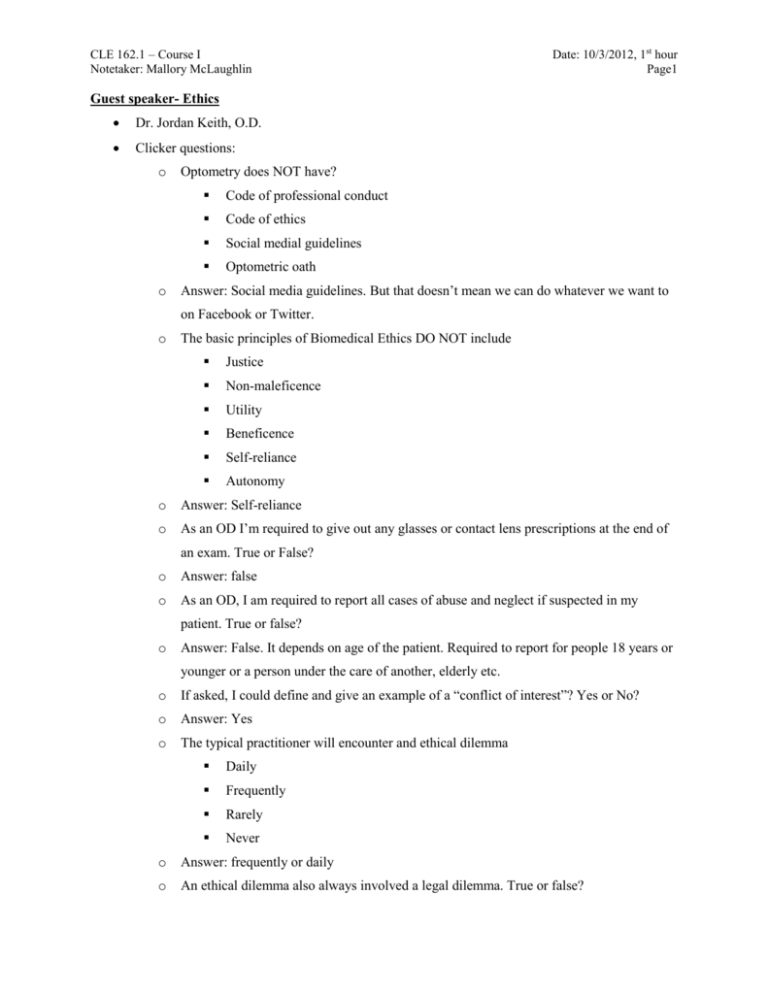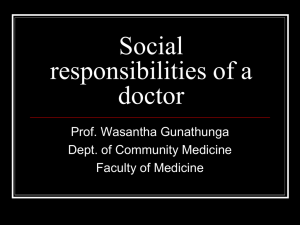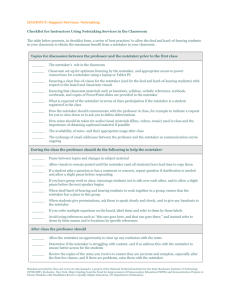Dear Notetaker:
advertisement

CLE 162.1 – Course I Notetaker: Mallory McLaughlin Date: 10/3/2012, 1st hour Page1 Guest speaker- Ethics Dr. Jordan Keith, O.D. Clicker questions: o o Optometry does NOT have? Code of professional conduct Code of ethics Social medial guidelines Optometric oath Answer: Social media guidelines. But that doesn’t mean we can do whatever we want to on Facebook or Twitter. o The basic principles of Biomedical Ethics DO NOT include Justice Non-maleficence Utility Beneficence Self-reliance Autonomy o Answer: Self-reliance o As an OD I’m required to give out any glasses or contact lens prescriptions at the end of an exam. True or False? o Answer: false o As an OD, I am required to report all cases of abuse and neglect if suspected in my patient. True or false? o Answer: False. It depends on age of the patient. Required to report for people 18 years or younger or a person under the care of another, elderly etc. o If asked, I could define and give an example of a “conflict of interest”? Yes or No? o Answer: Yes o The typical practitioner will encounter and ethical dilemma Daily Frequently Rarely Never o Answer: frequently or daily o An ethical dilemma also always involved a legal dilemma. True or false? CLE 162.1 – Course I Notetaker: Mallory McLaughlin Date: 10/3/2012, 1st hour Page2 o Answer: false. If something is an ethical dilemma, it doesn’t always have to be illegal o Regarding patient care, “standard of care” and “minimally required” mean the same thing. True or false? If you get in trouble as a practitioner and go to court, they will ask what the average optometrist would do in that case, that’s the standard of care o Answer: false Ethics: o We should all be ethical people, we are serving the public, and we are professionals. The public relies on us to make decisions in the best interest of the patient. We will be making these decisions every day. o Definition: The rules of conduct recognized in respect to a particular class of human actions or a particular group, culture, etc. o Ethics: also known as moral philosophy, is a branch of philosophy that addresses questions about moraility- that is concepts such as good and evil, right and wrong, virtue and vice, justice, etc. o What do ethics mean to you: depends on what group of people you’re looking at. Citizen, parent, friend, doctor, student, classmate. o Eye doctor roles: Take care of and improve vision and to maintain level of vision they have Manage pain and discomfort Manage systemic health Limiting iatrogenic harm Rehabilitation (if someone goes blind or can’t function the way they should because of their vision, get them back to the quality of life that they want to be at) Emotional/psychological- need to be good educators but do it in a way that’s compassionate. (what it means to give bad and good news)- “Every time a doctor sees a patient, the patient should feel better as a result? “We must free ourselves from the expectations of others and discover for ourselves what we are really called to do in the world?” - Socrates “Mature persons realized they owe the world something. Certainly the earth would be a better place if each of us delivered a needed service to others. Service, I believe, is the arithmetic sum of knowledge plus carin.”- Willis Hurst, MD CLE 162.1 – Course I Notetaker: Mallory McLaughlin Date: 10/3/2012, 1st hour Page3 “Ones searches for a physician with whom, above all else, is a fellow human being whose concern for patients is actuated by the joy of serving, regarding it as an incomparable privilege.” –Bernanrd Lown, MD “See life as an opportunity to improve the world around you and the people around you- wanting to make the lives of your patients, your classmates, your co-workers, and strangers better- which in turn make your life better.”- Tim Harkins, OD Biomedical ethics o Definition- Moral principles and decision in the context of medical practice, policy and research. o 5 major principles: Non-maleficence- Do no harm, and avoid needless risk. Prevent iatrogenic harm. Beneficence- Promote the welfare of your patient to the best of your ability Utility- Greatest good with the least harm Justice- Fairness. Treat he same issues the same way. Respect patients right and treat every patient fairly Autonomy- Rational individuals have the right to make their own decisions about their own healthcare o AOA Code of Ethics To keep their patients’ eye, vision, and general health paramount at all times; To respect the rights and dignity of patients regarding their health care decisions’ To advise their patients’ whenever consultation with, or referral to antoher optometrist or other health professional is appropriate; To ensure confidentially and privacy of patients’ protected health and other personal information; To strive to ensure that all persons have access to eye, vision, and general health care; To advance their professional knowledge and proficiency to maintain and expand competence to benefit their patients; (constantly bettering yourself throughout your entire career) To maintain their practices in accordance with professional health care standards; To promote ethical and cordial relationship with all members of the health care community; To recognize their obligation to protect the health and welfare of society; CLE 162.1 – Course I Notetaker: Mallory McLaughlin Date: 10/3/2012, 1st hour Page4 To conduct themselves and exemplary citizens and professionals with honest, integrity, fairness, kindness and compassion; o Optometric Oath With full deliberation I freely and solemnly pledge that: will practice the art and science of optometry faithfully and contentiously, and to the fullest scope of my competence. I will uphold and honorably promote by example and action the highest standards, ethics and ideals of my chosen profession and the honor of the degree, Doctor of Optometry, which has been granted me. It’s okay to tell your patient you don’t know. It’s part of your oath to make sure you get the patient to the hands of someone who does Promote model citizenship to everyone around you I will provide professional care for those who seek my services, with concern, with compassion and with due regard for their human rights and dignity Be compassionate I will place the treatment of those who seek my care above personal gain and strive to see that none shall lack for proper care Shouldn’t always be about making a profit, although you do need to make a living and pay your employees, etc If someone needs care, its our responsibility to give it I will hold and privileged and inviolable and information entrusted to met in confidence by my patients. Inviolable- never to be broken, infringed or dishonored I will advice my patients fully and honestly of all which may serve to restore, maintain or enhance their vision and general health I will strive continuously to broaden my knowledge and skills so that my patients may benefit from all new and efficacious means to enhance the care of human vision. I will share information cordially and unselfishly with my fellow optometrists and other professionals for the benefit of patients and the advancement of human knowledge and welfare. I will do my utmost to serve my community, my country and humankind as a citizen as well as an optometrist As a whole, doing things that benefit society and everyone, not just yourselves. CLE 162.1 – Course I Notetaker: Mallory McLaughlin Date: 10/3/2012, 1st hour Page5 I herby commit myself to be steadfast in the performance of this my solemn oath and obligation. We need to be ethical in all aspects of our lives as friends, classmates, parents, doctors, etc. “What kind of person you want to be will influence what kind of doctor you want to be and the image you will project to patients; your purpose and motives in doctoring will influence the kind of doctor you will be; how you want to interact with patients will influence the kind of doctor you will be, how you speak to them, and what you say to them; how you define the doctor’s role will influence the kind of doctor you will be.”- Tim Harkins, OD








